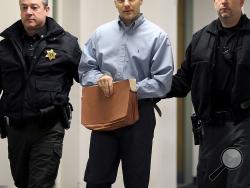Selenski gets life in prison
Posted: February 18, 2015 - 7:31pm
WILKES-BARRE (AP) -- A jury on Wednesday spared the life of a man convicted of strangling a pharmacist and his girlfriend in 2002 and burying their bodies in his yard, granting a defense request to show mercy despite the brutal nature of the crimes.
Hugo Selenski, 41, was convicted last week on two counts of first-degree murder in the killings of Michael Kerkowski and Tammy Fassett during a robbery at the pharmacist's home. He showed no reaction to the jury's decision, which means he will serve life without parole. He will be formally sentenced next month.
One of Selenski's lawyers, Bernard Brown, said he was pleased with the decision to spare him.
"We're happy," he said. "We're relieved, not only for Hugo but for the family."
He said Selenski, who declined to comment, maintains his innocence and plans to appeal the guilty verdict.
Kerkowski's teenage son said after the jury's decision there is no winner.
"I will never have my father back," Connor Kerkowski tweeted. "but maybe now there can now be closure and justice for my family. hugo can rot in jail."
Fassett's relatives showed no reaction in court and had no comment later.
Prosecutors had asked for a death sentence for Selenski, saying he and a co-conspirator brutally beat Kerkowski to compel him to reveal the location of tens of thousands of dollars he kept in his house and then used plastic flex ties to strangle him and Fassett.
The pharmacist had pleaded guilty to running an illegal prescription drug ring and was about to be sentenced when he and Fassett were reported missing in 2002. About a year later, authorities found their decomposing bodies and at least three other sets of human remains on Selenski's property near Wilkes-Barre.
Prosecutors argued Kerkowski was tortured, one of the aggravating circumstances they urged jurors to consider in deciding Selenski's fate.
"The defendant has repeatedly used fear and lies and pain and death in order to obtain frivolous, material things," Sam Sanguedolce, Luzerne County first assistant district attorney, told jurors in his closing argument. "The defendant has earned his sentence."
Prosecutors and jurors declined to comment after the jury's decision was announced.
Selenski's attorney Edward "E.J." Rymsza begged the jurors to spare his client's life, asking them to ignore "voices of vengeance and retribution."
The defense tried to cast Selenski as a good father, brother and uncle even behind bars, with family members testifying earlier Wednesday that he wrote frequently and gave life advice.
Two of Selenski's daughters and four of his sisters spoke of their love for him, calling him an intelligent and caring man who's protective of his family, a portrait starkly at odds with the greedy, manipulative killer described in earlier trial testimony.
The two youngest sisters, both nursing students in their 20s, said he served as a father figure while briefly taking care of them more than a dozen years ago while their dad, now deceased, was ill.
"I wouldn't be who I am today without him," Katlyn Selenski said.
Selenski has spent most of the last 20 years in prison, with convictions for a 1994 bank robbery, a 2003 home invasion and robbery and now murder. He escaped from a county lockup in 2003 using a rope fashioned from bed sheets but turned himself in days later. Now he will spend the rest of his days in a maximum security state prison.
In 2006, he beat two other homicide charges in the deaths of two suspected drug dealers whose charred remains also were found in his yard. The fifth body found on the property was never publicly identified.
Even if the jury had sentenced Selenski to die, he likely would have spent decades on death row and might never have received a lethal injection.
Democratic Gov. Tom Wolf recently declared a moratorium on the death penalty, calling the current system of capital punishment "error prone, expensive and anything but infallible." Philadelphia's district attorney has filed a legal challenge to the moratorium.
Pennsylvania has executed only three inmates since the U.S. Supreme Court restored the death penalty in 1976, the last one in 1999. All three had voluntarily given up their appeals.

